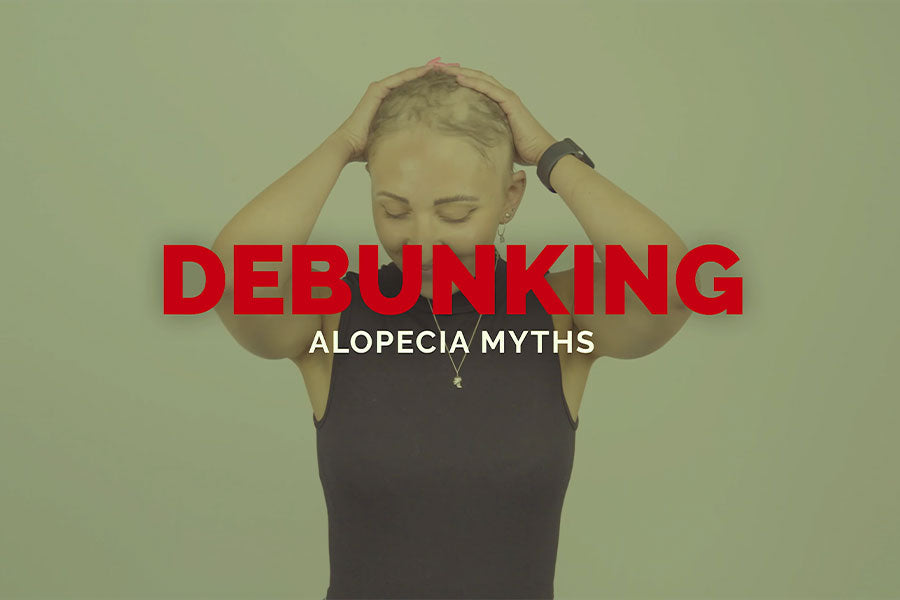Emily Smith (AKA Alopecia Diaries) has amassed hundreds of followers through sharing stories about her journey with alopecia. Through her following, many similar but often misguided questions about alopecia come up.
In our latest video, she wants to help shed some light on the truths everyone should know and debunk some of the common myths that she and others with the same condition must deal with, especially as it impacts 15 out of 10,000 people in the UK (roughly 100,000 of the total population).
What is Alopecia?
There are several different types of alopecia with various levels of severity, but each type causes hair loss. Some people with alopecia lose hair on their head while others may lose hair from their body and eyebrows. Alopecia can be an autoimmune disorder, which means that the body’s natural immune system will believe that the hair follicles are harmful and therefore, attack and kill them.
Read our blog to learn more about alopecia and what causes it.
Common Alopecia Myths to Be Aware Of
Is alopecia a sign that you’re unhealthy?
While alopecia can be an autoimmune reaction, most people with alopecia are healthy, fit individuals, who don’t have any other symptoms.
Emily explains that there is often no rhyme or reason why alopecia happens,
'It’s just something in my body that is rejecting my hair follicles and therefore it’s falling out.'
Most people will experience hair loss without other symptoms however if hair loss is accompanied by other symptoms, it’s always best to talk to your GP to check for any underlying conditions.
Will hair supplements help your hair grow?
Many supplements and vitamins will claim that they can help treat hair loss however Emily says that this is not the case with those who have alopecia. There is currently no real scientific evidence to say that they can actually help so be cautious when researching treatment or supplement options.
Emily hopes that one day they will find a treatment or supplement to help,
‘but it's simply not the case at the moment.’
Will alopecia cause all your hair to fall out?
A common myth is that alopecia causes every single one of your hairs to fall out. Depending on the type of alopecia you have will depend on how much hair falls out and where that happens. Throughout Emily’s journey with alopecia, she has experienced different levels of hair loss.
She says,
‘I’ve had my eyebrows fall out and my eyelashes, but now my lashes have come back, I’ve got half an eyebrow on my right eyebrow and I’ve got patchiness coming back on my head.’
Emily knows people with alopecia who have suffered from complete hair loss where hair has gone through different stages of hair growth and others where hair has never grown back. It’s completely unique for every person but it is a myth that alopecia will cause all hair to fall out.
Is alopecia a sign of cancer?
Many people wonder whether alopecia areata is a sign of cancer, but this is also a myth. The conditions are unlinked and if you have alopecia, that doesn’t mean you will get cancer.
Emily says,
‘unfortunately you could get both in your life however the two are not linked in any way.’
Individuals with cancer may experience hair loss as a result of having chemotherapy though. Read our blog on dealing with chemotherapy hair loss.
Can managing stress levels help you manage alopecia?
This is also a myth, according to Emily. While stress may be one factor in developing alopecia, it can be hard to pinpoint why someone gets alopecia and there could be multiple other factors to consider such as your environment, genes, and diet.
Emily says that,
‘while talking to others and focusing on self-care can help, it won’t necessarily cure your alopecia’.
Read more about stress-related hair loss and how it can be caused.
Will having a good hair care routine help?
As alopecia starts from the inside, what you do in terms of your hair care routine won’t help when it comes to alopecia.
Racing out to
‘buy the latest regrowth shampoo or using rosemary oil, won’t unfortunately make miracles happen’.
Before considering any products or solutions, Emily’s advice is always to talk to an expert or someone who has been through Alopecia to see whether what you’re looking into could be effective. Emily is keen for people to reach out to her on her social media channels @AlopeciaDiaries_ on TikTok or Instagram for advice, or alternatively, you can talk to a wig specialist who has experience with alopecia such as Joseph’s Wigs or Alopecia UK.
Real-life alopecia stories
Here at Joseph’s Wigs, we want to encourage others to speak out and share their own journey with alopecia, to help others who may be in the same position.
Many of our customers have reached out to bravely tell their stories including how they’ve dealt with hair loss and how wearing wigs has helped them regain their confidence. Read our inspiring customer hair loss and wig wearing stories.












